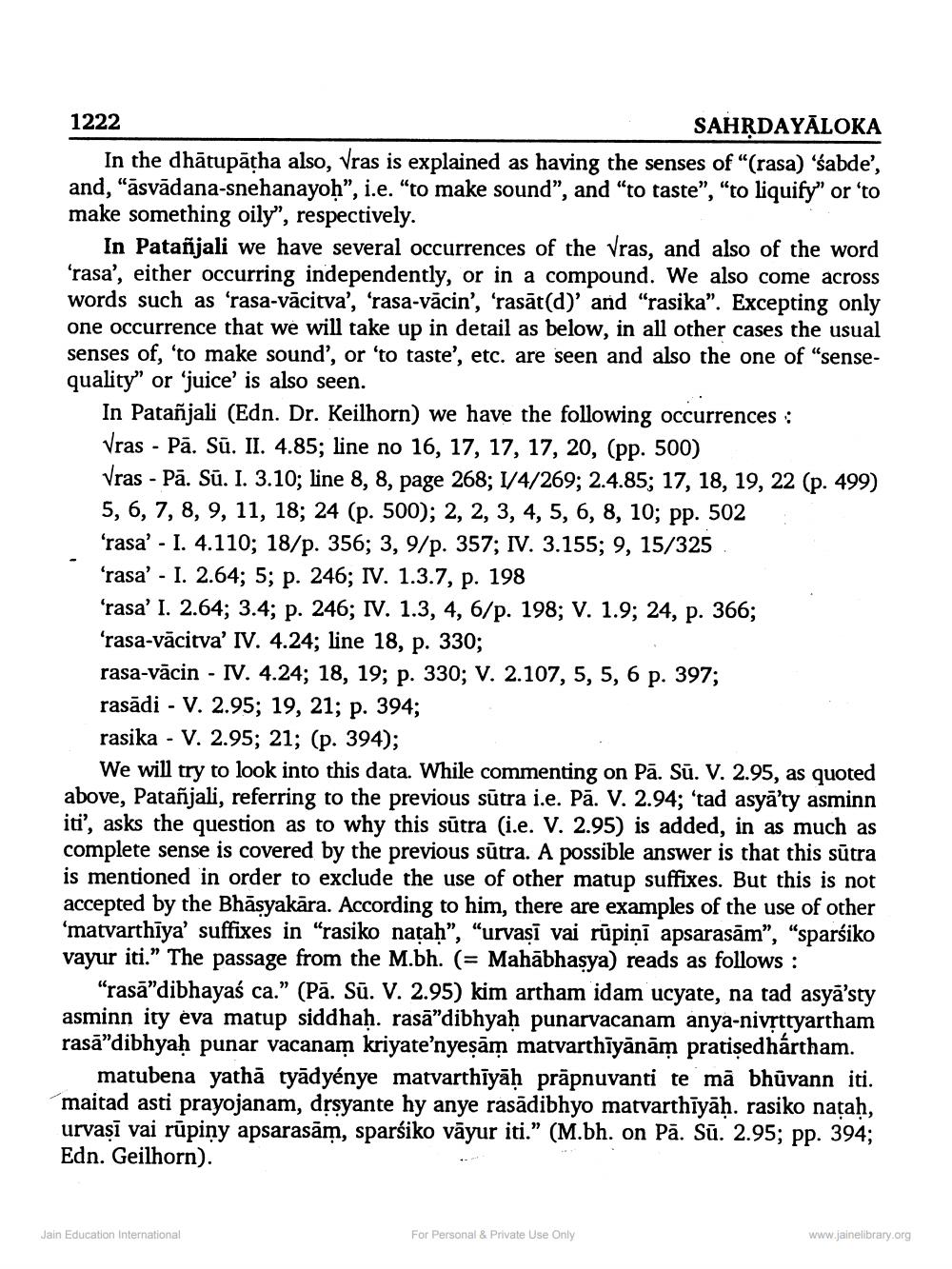________________
1222
SAHRDAYĀLOKA In the dhātupātha also, Vras is explained as having the senses of "(rasa) 'sabde', and, "āsvādana-snehanayoh”, i.e. “to make sound", and "to taste”, “to liquify" or 'to make something oily", respectively.
In Patañjali we have several occurrences of the Vras, and also of the word 'rasa', either occurring independently, or in a compound. We also come across words such as frasa-vācitva', 'rasa-vācin', 'rasāt(d)' and "rasika”. Excepting only one occurrence that we will take up in detail as below, in all other cases the usual senses of, 'to make sound', or 'to taste', etc. are seen and also the one of “sensequality” or “juice' is also seen.
In Patañjali (Edn. Dr. Keilhorn) we have the following occurrences : Vras - Pā. Sū. II. 4.85; line no 16, 17, 17, 17, 20, (pp. 500) Vras - Pā. Sū. I. 3.10; line 8, 8, page 268; 1/4/269; 2.4.85; 17, 18, 19, 22 (p. 499) 5, 6, 7, 8, 9, 11, 18; 24 (p. 500); 2, 2, 3, 4, 5, 6, 8, 10; pp. 502 'rasa' - I. 4.110; 18/p. 356; 3, 9/p. 357; IV. 3.155; 9, 15/325 ‘rasa' - I. 2.64; 5; p. 246; IV. 1.3.7, p. 198 'rasa' I. 2.64; 3.4; p. 246; IV. 1.3, 4, 6/p. 198; V. 1.9; 24, p. 366; 'rasa-vācirva' IV. 4.24; line 18, p. 330; rasa-vācin - IV. 4.24; 18, 19; p. 330; V. 2.107, 5, 5, 6 p. 397; rasādi - V. 2.95; 19, 21; p. 394; rasika - V. 2.95; 21; (p. 394);
We will try to look into this data. While commenting on Pā. Sū. V. 2.95, as quoted above, Patañjali, referring to the previous sūtra i.e. Pā. V. 2.94; 'tad asyā'ty asminn iti', asks the question as to why this sūtra (i.e. V. 2.95) is added, in as much as complete sense is covered by the previous sūtra. A possible answer is that this sūtra is mentioned in order to exclude the use of other matup suffixes. But this is not accepted by the Bhāsyakāra. According to him, there are examples of the use of other ‘matvarthīya' suffixes in "rasiko natah”, “urvasi vai rūpini apsarasām", "sparsiko vayur iti.” The passage from the M.bh. (= Mahābhasya) reads as follows :
“rasā”dibhayaś ca.” (Pā. Sū. V. 2.95) kim artham idam ucyate, na tad asyā'sty asminn ity eva matup siddhaḥ. rasā"dibhyaḥ punarvacanam anya-nivsttyartham rasā"dibhyaḥ punar vacanam kriyate’nyeșām matvarthīyānām pratiședhártham.
matubena yathā tyādyénye matvarthīyāḥ prāpnuvanti te mā bhūvann iti. maitad asti prayojanam, drsyante hy anye rasādibhyo matvarthīyāh. rasiko natah, urvasi vai rūpiny apsarasām, sparsiko vāyur iti." (M.bh. on Pā. Sū. 2.95; pp. 394; Edn. Geilhorn).
Jain Education International
For Personal & Private Use Only
www.jainelibrary.org




